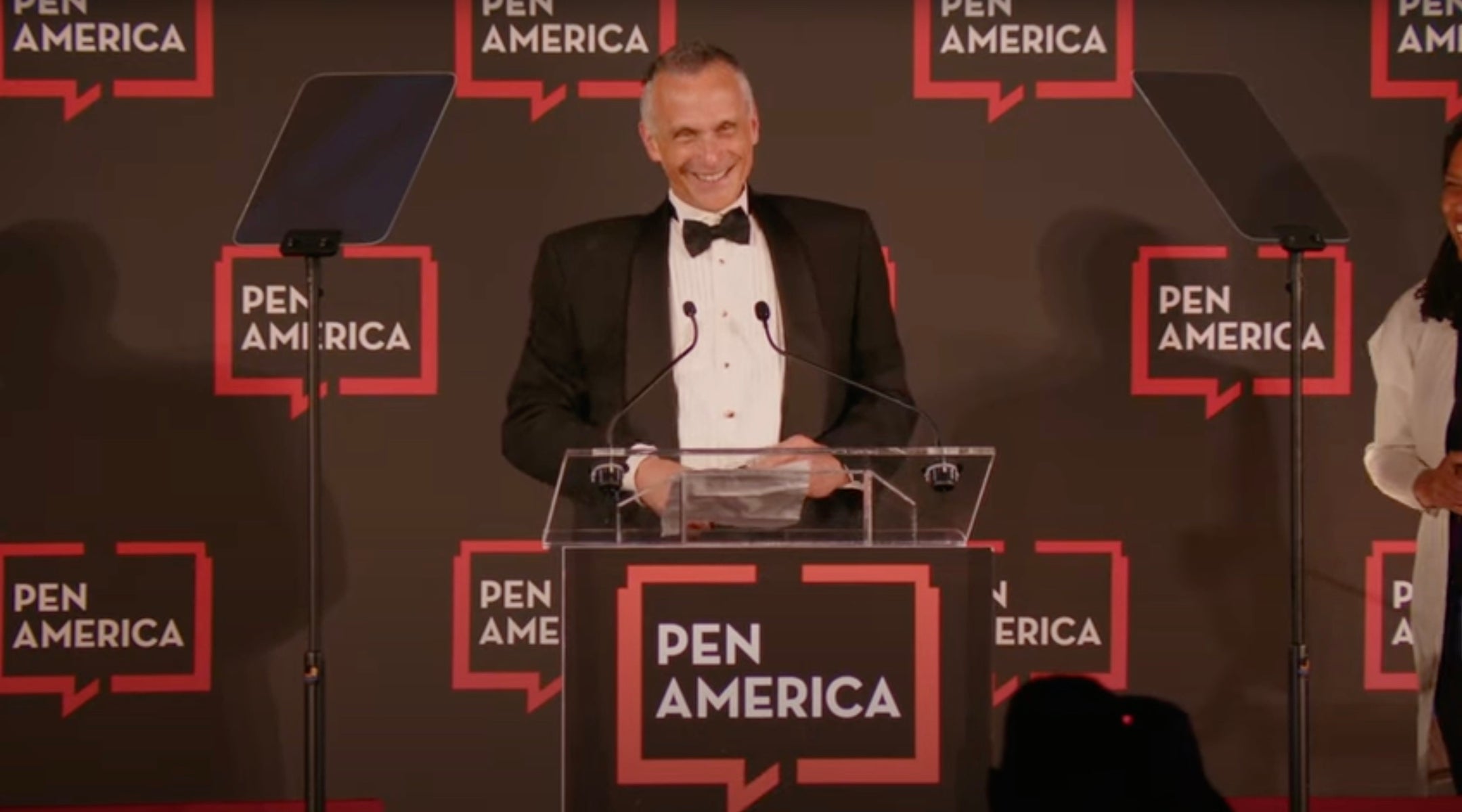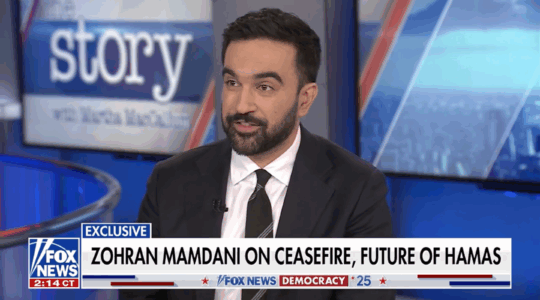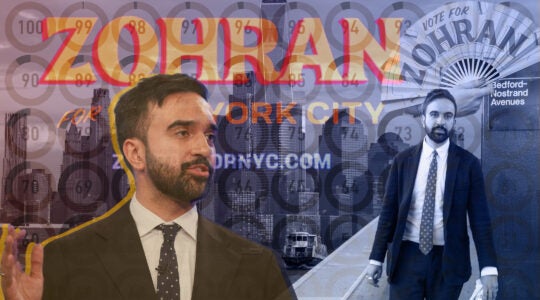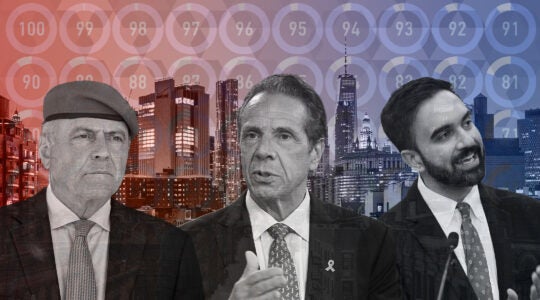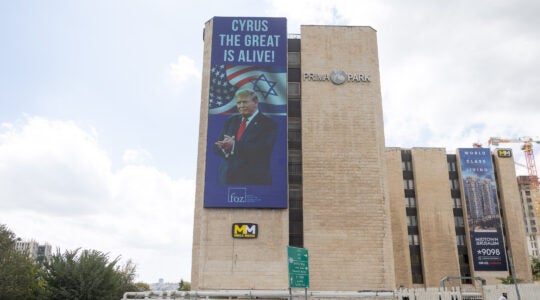As he often does these days, Wesleyan University president Michael Roth recently delivered a lecture on another campus outlining all the reasons why academia should be more forcefully standing up to President Trump’s policies.
He peppered the lecture with Yiddish words. He laid thick on what he called his “Jewish accent.” A colleague came up to him afterwards.
“You’re doing Jew-speak,” they told him.
Roth laughed recalling his response: “No s–t, Sherlock. That’s part of what I’m doing.”
What he’s doing, Roth told the Jewish Telegraphic Agency in a recent interview, is constantly reminding his potential critics who he is. For one, he’s the only university president in the country who openly, repeatedly rejects Trump’s claims that the administration’s campus crackdowns — rescinding grants, limiting international student visas, dismantling “DEI” — are a means of fighting antisemitism after the Oct. 7, 2023, Hamas attack on Israel.
For another, when his own school dealt with pro-Palestinian encampments last year, he made no secret of handling the matter diplomatically instead of through discipline — an approach that landed other university presidents in hot water, but not him.
And above all that, he’s proudly Jewish.
“If you’re going to accuse Wesleyan’s administration of being antisemitic, start with me. But don’t call me on Saturday,” Roth quipped. “Because I’m going to be in Torah study.”
Roth isn’t quite sure how he, the leader of a small-town Connecticut liberal arts school with a mere 3,000 students, became so unusual among his profession by defending what he sees as the central principles of academic freedom.
“It’s a bit of a puzzle,” he told JTA. “I don’t think my view is very original. Any of the presidents I know at different schools probably have similar views.” His views also seem to align with most American Jews, at least according to polls, which show that nearly three-quarters of them also believe Trump is using antisemitism as an excuse to attack higher education.
In recent days, two other Jewish presidents, at the Massachusetts Institute of Technology and Brown University, have publicly rejected a Trump administration offer of “priority” funding that would have required them to bar some forms of speech, making them the only university leaders to do so. But Roth still stands out in the lengths he is going to rebuff Trump’s higher education policies — and to center his Jewish identity in doing so.
There he is, accepting a “courage award” from the literary free-speech group PEN America “for standing up to government assaults on higher education.” There he is, giving interviews in which he lambasts “prominent Jewish figures around the country who get comfortable with Trump, it seems to me, because they can say he’s fighting antisemitism: ‘He’s good for the Jews.’ It’s pathetic. It’s a travesty of Jewish values, in my view.”
There he is, signing an open letter declaring that antisemitism “is being used as a pretext to abrogate students’ rights to free speech, and to deport non-citizen students.” The leaders of Jewish Voice for Peace, an anti-Zionist group that has been suspended from multiple college campuses for disruptive protests, were on that letter. So was the leader of Wesleyan University.
And there he is, telling JTA that so-called institutional neutrality positions, adopted by a range of universities amid the Israel-Gaza war (and supported by the Jewish campus group Hillel International), are “bogus.”
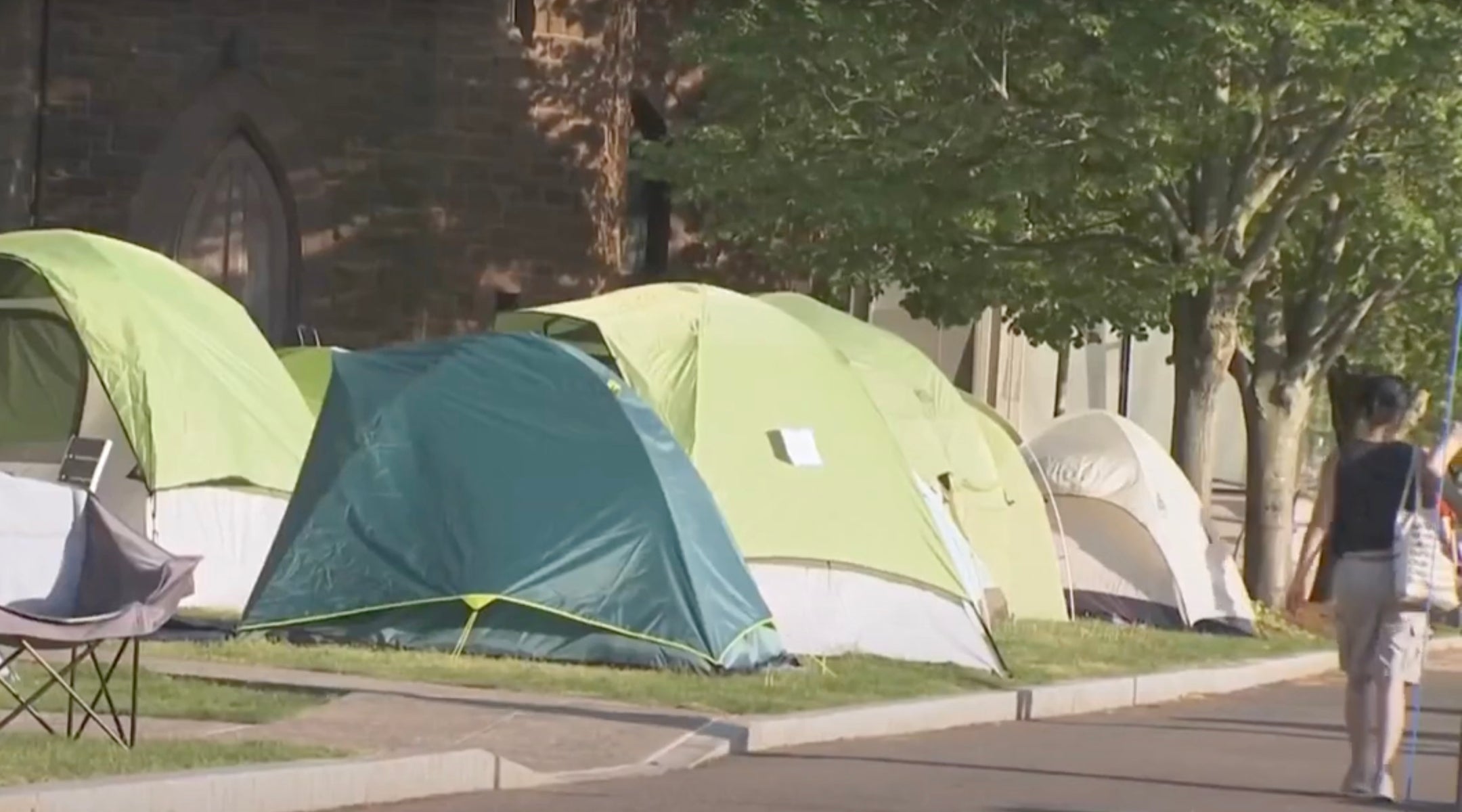
Pro-Palestinian encampments at Wesleyan University in Middletown, Connecticut, May 9, 2024. (Screenshot)
A representative for the American Association of University Professors, a faculty union that has dropped its former opposition to boycotting Israel, praised Roth’s presence on the national stage.
“Michael Roth is criticizing the misuse of Title VI to define anti-semitism as criticism of Israel and its weaponization in the campaign to attack higher education. There is nothing startling about that position,” Joan W. Scott, a Jewish researcher at the Institute for Advanced Study who sits on the union’s academic freedom committee, told JTA.
Scott added, “I’d say Roth’s reasons for his courageous stance have to do with his integrity and perhaps his knowledge of history. He doesn’t want to be among those who, like Heidegger, thought that appeasing the regime in power was a safe position to take.” (A spokesperson for the Foundation for Individual Rights and Expression, a campus free-speech advocacy group that supports institutional neutrality, declined to comment on Roth.)
Roth’s profile has caught the attention of some Jewish families, including that of Mason Weisz of White Plains, New York, who said Roth was one reason that his son is a first-year at Wesleyan now. Weisz recalled hearing an NPR interview with Roth in April, after admissions decisions were out but before seniors had to pick their schools, as particularly pivotal.
The interview “in which he argues that Trump’s use of antisemitism to justify his strong-arming of universities actually is bad for the Jews, encapsulates everything I appreciated about Roth.” Weisz told JTA. “Here is a university president who is willing to risk going on record against the administration, again and again, to fight for academic integrity. He has a nuanced view of world events, an appreciation for true debate, and a fearlessness that I hope are an inspiration for Wesleyan’s faculty and students.”
Roth also earns good marks from some Jewish students on campus.
“He does care about Jewish students. He’s someone who does take their concerns seriously. And compared to other university presidents, he’s been better,” said Blake Fox, a Jewish senior at Wesleyan who identifies as pro-Israel and serves on the campus Chabad board. “He wants to be the ‘cool’ president.”
Fox says he had a good experience as a Jew at Wesleyan, in part because the encampments there never felt threatening (he noted the protest movement was much smaller at Wesleyan than it was at other schools). That was due, at least in part, to Roth’s efforts to peacefully negotiate an end to the encampments.
Yet, Fox said, the president — whom he’s met several times — was also deeply concerned for the well-being of Jewish students. In meetings with Fox and other Jews on campus, Roth vowed to take action if any protesters ever threatened a Jewish student by name.
He also appreciated Roth standing up to Trump, particularly on issues of campus speech. “I’m pro-Israel, but I also support the First Amendment,” Fox said. “Even if there are individuals whose speech is bad, targeting them for deportation is a dangerous precedent, I think.”
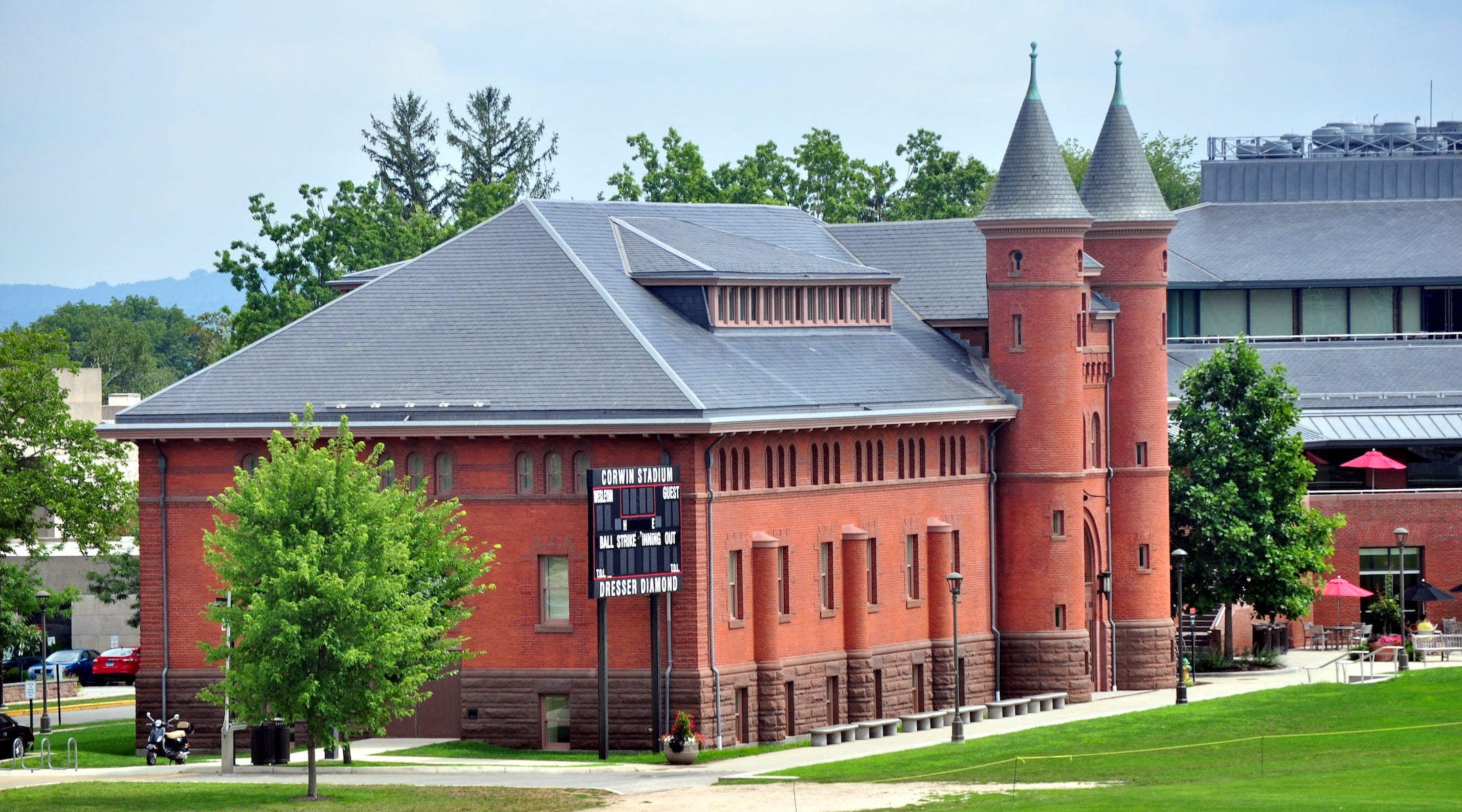
The campus of Wesleyan University, July 24, 2013. (Joe Mabel via Creative Commons)
Though a historically Methodist school, Wesleyan today has no religious affiliation and enrolls around 600 Jewish students — nearly 20% of the student body. There’s no Hillel, but the school’s Jewish community includes a full-time rabbi, student leadership, dedicated Jewish residential housing, and a unique, modern sukkah that has won architecture awards. The Wesleyan Jewish Community rabbi declined to comment for this story.
There’s also a Chabad outpost, which opened in 2011. Its director, Rabbi Levi Schectman, told JTA he was “grateful for the open door to the President’s office and for the strides that have been made so far,” adding, “There is still more work to be done so that all students feel heard and safe.”
Schectman also said the Wesleyan Jewish community he interacts with is “living and thriving”: A recent “Mega Shabbat” gathering drew what he said was a center record attendance of 175 students.
And then, of course, there’s Roth, the school’s first Jewish president, who has held the post since 2007. A free-speech scholar, he’s published books about the campus environment, including one called “Safe Enough Spaces.” He grew up in a Reform household on Long Island and has written essays on Jewish identity, but considered himself “only modestly observant” until his father died 25 years ago. After that point, he said, he “began saying Kaddish and subsequently attending Torah study.”
Nowadays Roth makes a point of involving himself in Jewish campus life — all forms of it. He spent Rosh Hashanah with the affiliated Jewish community, and, last year, caught a Shabbat service held at the pro-Palestinian student encampments.
The latter group wasn’t too thrilled to see him there, he recalled; they’d been targeting him by name, often in insulting language. But he wanted to learn more about the Jews who were participating in the protests right outside his office. When one of them, an Israeli, personally apologized to Roth for the aggressive behavior of other encampment participants, he invited the student to his office and they had a long chat. “There were so many interesting conversations,” he said.
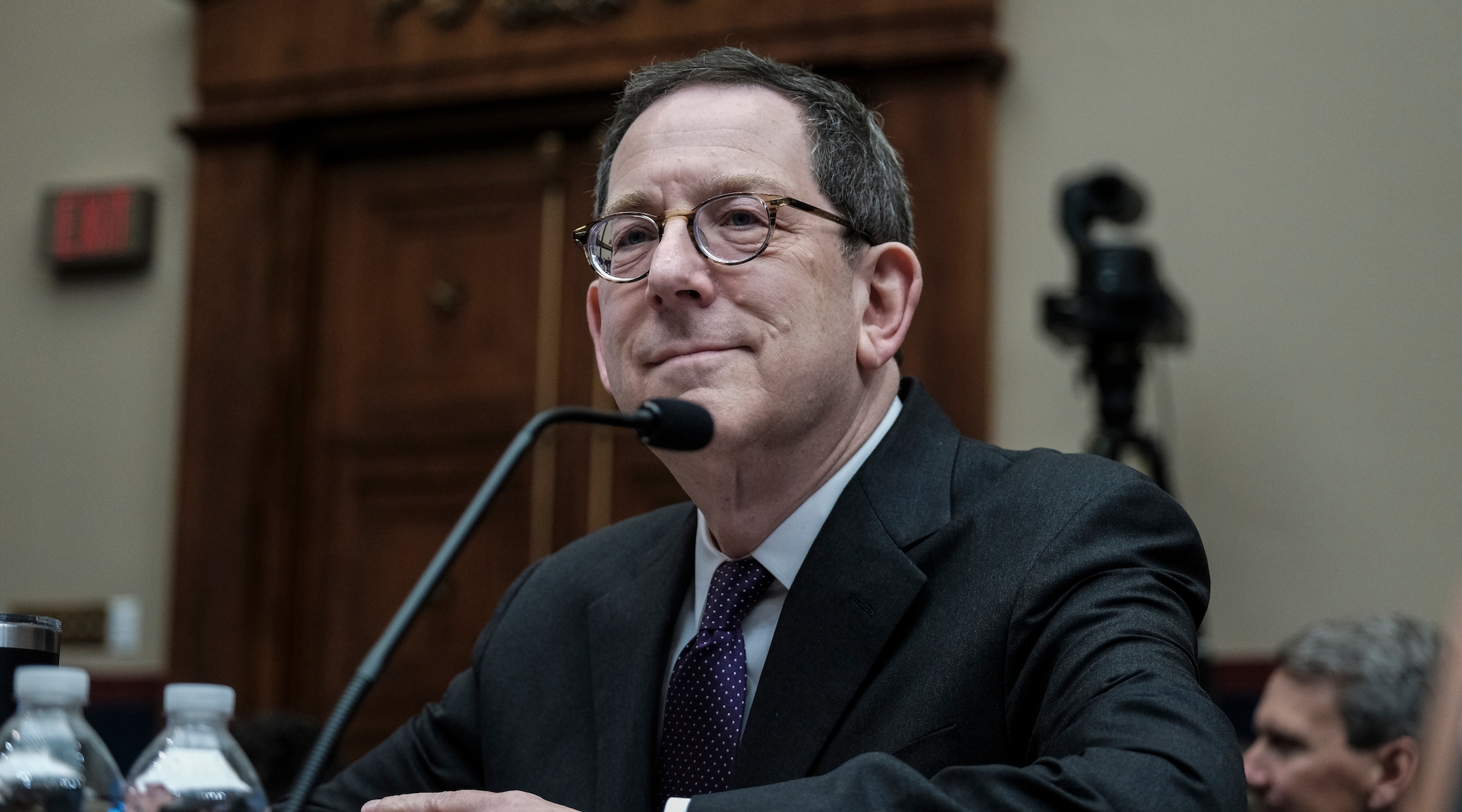
Michael Schill, President of Northwestern University, testifies at a hearing called “Calling for Accountability: Stopping Antisemitic College Chaos” before the House Committee on Education and the Workforce on Capitol Hill on May 23, 2024 in Washington, D.C. (Michael A. McCoy/Getty Images)
Of course, many Jews in academia know that merely being Jewish cannot protect oneself from charges of enabling antisemitism. It didn’t save Northwestern University president Michael Schill, who — like Roth — is a free-speech scholar who tried to deal with his school’s encampments through negotiation instead of by force.
In so doing, Schill was hauled before Congress and lost the confidence of many of his Jewish faculty, staff and alums. The heads of the Anti-Defamation League and Jewish Federations of North America, both Northwestern alums, publicly aligned against him. Last month, Schill announced he was stepping down.
Roth doesn’t know Schill personally, but said he thought it was “just terrible” he had resigned. “I found it very sad that the board didn’t come to his defense in a way that allowed him to continue,” Roth said.
He acknowledges he’s in a better position to speak out than the heads of other universities, where hospitals and major research centers are more reliant on federal funding, and where instances of antisemitism had been more prevalent pre-Trump.
Schools like Columbia have made significant concessions to Trump, including on antisemitism issues, in exchange for having their funding restored. Harvard, after initially putting up resistance to Trump’s demands, has now reportedly entered a negotiation phase; the University of California system has also been targeted for a $1 billion payout to the government. Last week, the Trump administration unveiled what it said was a new “compact” that schools would be required to sign to secure their federal funding; the demands include one to protect conservative viewpoints on campus.
Is Roth worried that Trump could turn on Wesleyan next?
“Didn’t I say I was Jewish?” he responded, laughing. “Am I worried? Of course I’m worried. I’m a worrier… I would hate to put Wesleyan at risk.” But, he said, that wouldn’t stop him. “I have three grandchildren. I want them to grow up in a country where they don’t have to be brave to speak up.”
As Jews marked the recent two-year anniversary of Oct. 7, Roth’s name was also on some things other Jewish leaders wouldn’t touch.
He spoke to JTA while on the road to a literary festival in Lenox, Massachusetts, co-sponsored by the left-wing magazine Jewish Currents, which has emerged as one of the loudest voices in Judaism to oppose both Israel and communal American Jewish support for it. He would be appearing onstage with the journalist M. Gessen, who has compared Israel’s actions in Gaza to Nazi Germany.
Roth told JTA he hadn’t known that Jewish Currents was a co-sponsor when he agreed to take part in the festival. But, he added, it wouldn’t have changed anything about his appearance. He’ll talk to anybody Jewish. He’s appeared on their editor Peter Beinart’s podcast, and a while back he submitted a piece to the magazine that was rejected (“I guess it was insufficiently anti-Israel,” he mused) and wound up running in the Forward instead.
He sees his own views on Israel as moderate. While he called for a ceasefire in March 2024, far earlier than many others in the Jewish world, he still refuses to call the Gaza war a genocide and remains adamant he supports “Israel’s right to exist.” He only blames Israel for what he said were the security failures that led to the Oct. 7 attack, which he had condemned immediately as “sickening.”
He takes Israel’s wartime behavior to task for “paving a path for egregious war crimes and a level of brutality and inhumanity that I never would have associated with the country.” Yet he remains “stunned,” even today, by what he called “the lack of basic sympathy, empathy, for the victims of those horrific murders” of Oct. 7.
“I pride myself on being realistic about the persistence of antisemitism,” he said. “Still, the callousness with which some people greeted those horrors was very disturbing.”
Yet when the encampments came for Wesleyan last spring, and some of their participants accused him directly of being complicit in genocide, Roth — unlike nearly every other university president — opted to negotiate with them. He wrote a piece in the New Republic declaring that he would not call the police, even though he knew the protesters to be in violation of some campus policies.
Even in that piece, he offered an ominous prediction: “My fear is that such protests (especially when they turn violent) in the end will help the reactionary forces of populist authoritarianism.”
Roth didn’t like many of the phrases his own campus protesters used, including “From the river to the sea, Palestine will be free.” Yet he forcefully defended their right to say it, angering some Jews on campus as a result.
“I try to have it both ways,” he said — weighing his principled views on both Israel and protest. This can sometimes lead to very intricate needle-threading. He recalled how, when an address he gave to prospective students was disrupted by pro-Palestinian protesters unfolding a banner, he let them continue and even acknowledged the banner before pressing ahead.
Fox does take issue with some of Roth’s stances, including his opposition to institutional neutrality.
“I think he fundamentally misunderstands what institutional neutrality is,” Fox said. “We don’t need to hear your views on Ukraine. We don’t need to hear your views on Israel.” Having the school president call for a ceasefire, he thought, is “alienating both sides of campus.”
More significantly for his job, Roth has long opposed the movement to boycott and divest from Israel. This has angered activists at Wesleyan, who, like those at other schools, have made divestment a central demand.
Last spring, in order to peacefully break up his school’s encampment movement, Roth had promised protest leaders they could make a case to the board for divestment that fall. When the board opted not to divest, a small number of protesters became angry and attempted to take over a university building.
“They were not very civil to my staff members,” Roth recalled, describing the protesters as basically daring him to take action.
That time, he did call the cops.
JTA has documented Jewish history in real-time for over a century. Keep our journalism strong by joining us in supporting independent, award-winning reporting.
